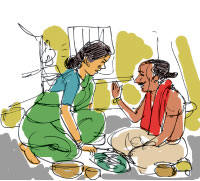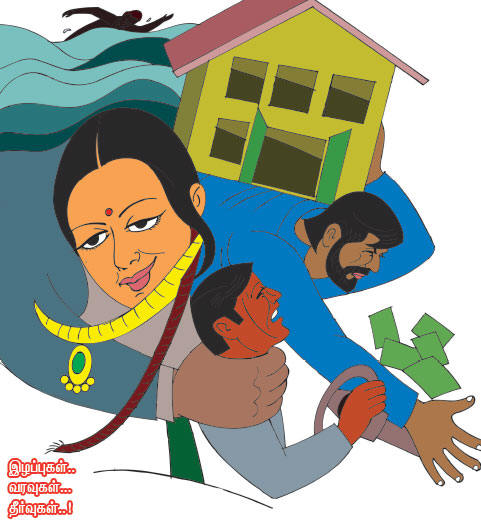TreeInTheSeed11
TreeInTheSeed11
Good judgment, the Great Sakthi!
Sēvāratṉā
Doctor T.S. Narayanaswamy
Images: Aras.
The problems of life are threefold:
The first one is problem we create for ourselves. Greed, anger, hasty
mind, wrong decisions…make this problem (s). The second one is caused by
friends, enemies, the unworthy, and the untrustworthy. The third problem
is unexpected causal problem beyond our control. This is fate or karmic
in nature.

(Notes by V. Krishnaraj. Prarabda Karma is of three categories:
(Adhibautika, Adhiatmika, and Adhidaivika = Exogenous, Endogenous and
Theogenous).
Exogenous
miseries and obstacles come from the outer world of beings and matter.
Lifestyle change can help ameliorate this misery.
Endogenous miseries and obstacles come
from the body, mind and soul; they need mending from proper specialists.
Theogenous miseries and obstacles are
god-sent and include natural disasters like floods, hurricanes,
earthquakes, tsunamis.... They could be part of karmic baggage of an
individual. The word ‘Theogenous’ was coined by me.
The first two problems find resolution from our persistent endeavour and
self-confidence. If you have the mental makeup to reflect on your
mistakes, feel compunction and genuinely want to reform yourself, a
great Sakthi from inside you will face these problems. For the second
type of problems, you can find a partial resolution by giving up friends
and acquaintances (the cause of problems). If you have the audacity to
expose the guilty, there is a partial resolution of the second type of
problems.
The third type is of different nature.
If tsunami hits suddenly with floods, causing damage to life and
limb, who are we to blame? Fate or Karma must be in operation. Accepting
the problems as fate or Karma, we should begin life anew. We need
inordinate self-confidence, mental strength, and tolerance to overcome
the problem. We need survival instincts to manage these problems.
Instead of thinking, ‘I need the sunlight,’ you must develop a sense of
confidence and say, ‘I have the sunlight within me.’ With that attitude,
you can emerge from the dark night of problems.
Plutarch says, “What we achieve inwardly will change outer reality.”
Tiruvalluvar says, “When troubles haunt you, laugh.”
Bharathi says, “Avoid fear.”
‘Facing adversity, cease trembling and face it head on. Calamity will surrender at your feet,’ said our ancestors. Will these golden words come to our rescue, when you are in the jaws of distress? ‘Easier said than done,’ said our wise man.
The writers publish research papers advising people on management of
problems. They say, “Do
this, do that.” It is hard to understand and carry out the advice. We
know the great human power in us. When we face problems, worry and fear
haunt us, we are torn to pieces, wither and droop and don’t know how to
rejuvenate the hidden creative potential buried deep within us.
It is like saying, “I know the way but have no legs to go there.” We
think we are a tiny seed. We don’t see the tree within us.
From time immemorial, life and living are concerned with satisfying the
basic needs: food, clothing and shelter. Long time ago, the needs were
basic: ‘eating a quarter measure, clothing four cubits,’ as said by
Avvaiyar. Those days the needs were small. They were self-satisfied with
what little they had. There were no huge problems. The modern man has
basic needs, conveniences, ostentation and compelling needs.
The needs, conveniences, ostentations (luxury)…are conditioned by wealth
and prosperity.
There are caste and economic divisions.
When people ascend from one economic category to the next
category (move up on the economic ladder), they face problems.
There is a proverb: The penniless cries for gruel; the rich cries for
milk. Both cry: that is true. Both have problems: that is true.
In the present-day world, food, clothing and shelter are not the only
needs. But in the world enveloped by pollution, we pay for good air and
good water.
Not knowing what to eat and what not to eat, we eat unfamiliar
(processed) foods. Their aftereffects compel us to go on a diet and seek
the help of physical fitness machines and outfits.
They take time, money, and related unavoidable problems.
Today’s latest fashion clothes are tomorrow’s (next month may be) old
fashion clothes. Though the gold goes for Rs. 23,000 each sovereign, the
desire has not diminished. Where is the money coming from for all these
buys? That is the problem. (You can always use the plastic. Yes, it will
catch up with you one day.)
Next is the house. Owning the house is on the top of the must-have list.
All entertain the thought, for good standing in the community, one must
own a house.
Drawn by advertisement of attractive houses, buying a house on
instalments (mortgage) and desiring to buy houses at bargain prices,
many buy houses as much as 60 km away from the workplace.
The tyranny of time has afflicted not only the husband and wife but also
the son and the daughter willing to chip in towards installment
payments.
Then there is a change in commute time to the office and mode of
transport by bus, rail… Expenses towards buying car, motor bike… are
another factor.
Sleeplessness, health issues, medical expenses… are the other problems.
Life has become commerce. Once you tabulate the loss and the gain, the
problems become easily solvable.
Tree will grow.
A solution like this?
 There
are many ways in finding a solution. Tirumuruga Krupananda Variar tells
a humorous story to illustrate, ‘A solution like this exists.’
There
are many ways in finding a solution. Tirumuruga Krupananda Variar tells
a humorous story to illustrate, ‘A solution like this exists.’
Velan lived in a village. He had modesty and patience. His wife was
quick to anger and a contrarian. Their married life was a mess. There
were daily fights. She did exactly the opposite of what he said. When
the village cautioned her against carrying tales and gossips, she did
just the opposite. The husband tried to intervene and correct her.
He could not do it. At one point, he was hurt in his heart, mind
and soul and sought the help of a Sannyasi to pursue Sannyāsam. Swāmiyār,
hearing his woes, knew his love for his wife and family will preclude
Sannyasam for him.
Sannyasi: “Vela! You say that your wife is a contrarian in word and
deed. You want your wishes carried out, Is it not true? It is very easy.
Whatever you desire, you tell your wife just the opposite.” “If you say,
‘Don’t cook today,’ she would cook what you like most.”
“Tell your wife, ‘Do carry tales and gossip with neighbors in
your spare time.’ She will stop doing it.
His problems ended.
